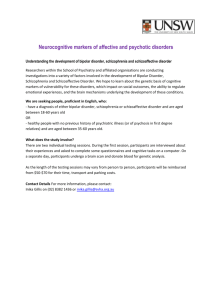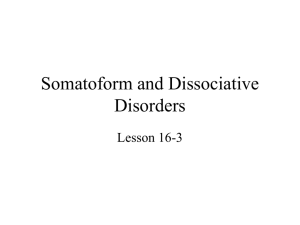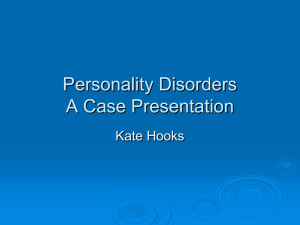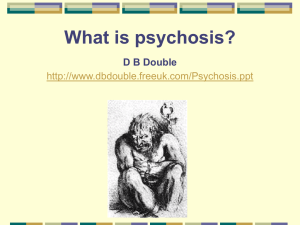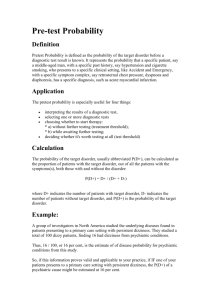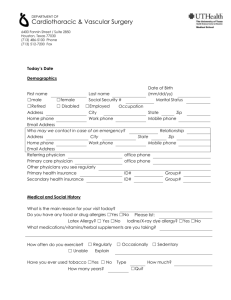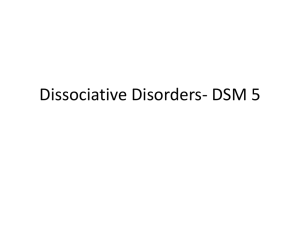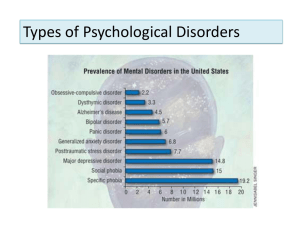File
advertisement
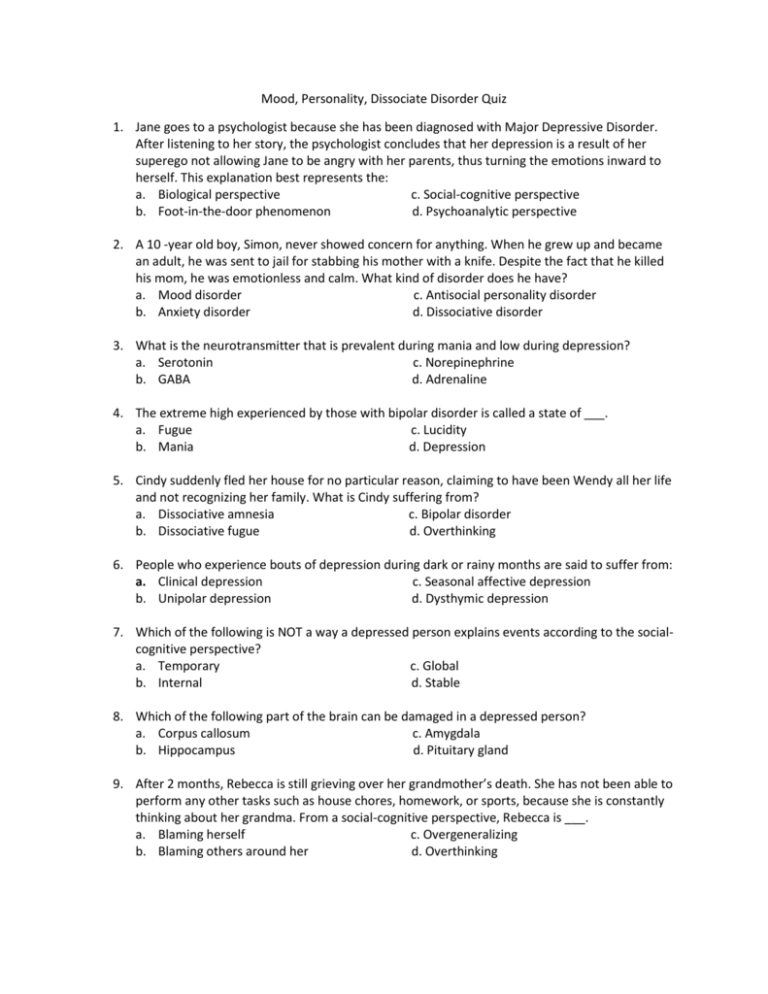
Mood, Personality, Dissociate Disorder Quiz 1. Jane goes to a psychologist because she has been diagnosed with Major Depressive Disorder. After listening to her story, the psychologist concludes that her depression is a result of her superego not allowing Jane to be angry with her parents, thus turning the emotions inward to herself. This explanation best represents the: a. Biological perspective c. Social-cognitive perspective b. Foot-in-the-door phenomenon d. Psychoanalytic perspective 2. A 10 -year old boy, Simon, never showed concern for anything. When he grew up and became an adult, he was sent to jail for stabbing his mother with a knife. Despite the fact that he killed his mom, he was emotionless and calm. What kind of disorder does he have? a. Mood disorder c. Antisocial personality disorder b. Anxiety disorder d. Dissociative disorder 3. What is the neurotransmitter that is prevalent during mania and low during depression? a. Serotonin c. Norepinephrine b. GABA d. Adrenaline 4. The extreme high experienced by those with bipolar disorder is called a state of ___. a. Fugue c. Lucidity b. Mania d. Depression 5. Cindy suddenly fled her house for no particular reason, claiming to have been Wendy all her life and not recognizing her family. What is Cindy suffering from? a. Dissociative amnesia c. Bipolar disorder b. Dissociative fugue d. Overthinking 6. People who experience bouts of depression during dark or rainy months are said to suffer from: a. Clinical depression c. Seasonal affective depression b. Unipolar depression d. Dysthymic depression 7. Which of the following is NOT a way a depressed person explains events according to the socialcognitive perspective? a. Temporary c. Global b. Internal d. Stable 8. Which of the following part of the brain can be damaged in a depressed person? a. Corpus callosum c. Amygdala b. Hippocampus d. Pituitary gland 9. After 2 months, Rebecca is still grieving over her grandmother’s death. She has not been able to perform any other tasks such as house chores, homework, or sports, because she is constantly thinking about her grandma. From a social-cognitive perspective, Rebecca is ___. a. Blaming herself c. Overgeneralizing b. Blaming others around her d. Overthinking 10. Amy always thinks that she is inferior to others, and she doesn’t value herself. She feels that no one will like her, so she doesn’t go to any parties nor joins any social group. What kind of personality disorder does she have? a. Avoidant personality disorder c. Schizophrenia b. Histrionic personality disorder d. Narcissist personality disorder 11. When Stacey is put in a stressful situation, she often alternates between two or more identities. One second she is nice and calm like her usual self, but the next second she becomes an angerfilled woman who speaks in a German accent. What kind of disorder is Stacey suffering from? a. Dissociative Identity Disorder c. Dissociative fugue b. Bipolar disorder d. Dissociative amnesia 12. Who believed that dissociative identity disorder was made up by fantasy-prone, emotionally vulnerable people? a. Freud c. Nicholas Spanos b. Eric Stice d. Adrian Raine 13. Eric had severe childhood trauma including sexual abuse. Therefore, he now lies and disregards rules constantly. He doesn’t think about others’ emotions and blames others about things that he did wrong. What kind of antisocial disorder does he have? a. Schizoid disorder c. Histrionic disorder b. Psychopathy d. Sociopathy 14. Why is unipolar depression referred to as the “common cold” of psychological disorders? a. You can catch it from people you come in contact with b. It is a medical disease of the body c. It is very common and widespread d. It is the most life-threatening disorder 15. Jerry suddenly quit his lifelong accounting job, emptied his savings account, and was found at home frantically trying to remodel his kitchen with no success. According to these behavioral symptoms, Jerry is most likely suffering from: a. Psychotic break c. Psychotic break b. Manic episode d. Retrograde amnesia 16. Dissociative amnesia can be caused by: a. A blow to the head b. Alcoholism c. Alzheimer’s d. All of the above 17. Janet’s boyfriend broke up with her, and now she’s barely left her bed for a month. She feels lethargic, has stopped trying to talk to her friends and family, and has had reoccurring thoughts of suicide. Janet would mostly like be diagnosed with: a. Bipolar disorder c. Major depressive disorder b. Antisocial personality disorder d. Clinical depression 18. True or false. Most episodes of major depressive disorder terminate on their own without seeking professional intervention. a. True b. False 19. This form of antisocial personality disorder is usually caused by genetics. One with this disorder won’t feel any emotions or guilt for his or her wrongdoing, and cannot form relationships with people. What type of antisocial personality disorder is this? a. Schizoid disorder c. Sociopathy b. Psychopathy d. Histrionic disorder 20. After Hannah was suddenly taken by an unfamiliar man, she alternated between a sweet girl to a mad Russian lady. What dissociative disorder is she suffering from? a. Dissociative fugue c. Personality disorder b. Depression d. Dissociative identity disorder 21. During a soccer game, Carol was hit in the head and suddenly suffered from a loss of memory about personal and general life events. What is Carol diagnosed with? a. Dissociative amnesia c. Panic disorder b. Anxiety d. Agoraphobia 22. What does someone who has a personality disorder display? a. A person with two or more distinct personalities b. Dysfunctional and long-lasting behavior patterns that harm one’s social functioning c. Fails to recall events d. Lots of empathy 23. The learning and psychoanalytic perspective of dissociative identity disorder has to do with how people deal with their: a. Anxiety c. Idea of loss b. Depression d. Social pressure 24. William recently received a D on his group project. Although William did all the work, he believed that it was all his fault, the D would ruin his grade in the class forever, and that he will never even be able to get into college at this rate. Additionally, William has recently been diagnosed with clinical depression. This explains his: a. Externalization of blame c. Positive attitude b. Abuse experienced as a kid d. Self-defeating beliefs Mood, Personality, Dissociative Disorder Quiz Answer Key 1. 2. 3. 4. 5. 6. 7. 8. 9. 10. 11. 12. 13. 14. 15. 16. 17. 18. 19. 20. 21. 22. 23. 24. D C C B B C A B D A A C D C B D C A B D A B A D

